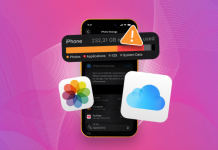
Uh-oh! Touchscreens are great. Tapping, swiping, and sliding your fingers around on the screen is fun and easy, but it also leaves a residue on the screen. Unfortunately, that residue can help unwanted people guess your device’s PIN. The smudges you leave can reveal the pattern you use to unlock your phone. If a nefarious person knows that a PIN is four digits long, and he or she also knows which four digits to use, it will only take 24 attempts before every possible combination is tried. Interestingly, if you only use three unique numbers in your pin, the possible number of combinations goes up to 36. That’s better than 24, but not substantially.
Better yet, I recommend turning off Simple PINs in iOS, and using a full-fledged password. Here’s how:
- Go to the Settings app
- Under “General,” select “Passcode Lock”
- Turn off “Simple Passcode”
- Enter a more secure password using letters, numbers, and special characters

Obviously, if you’re just using an iPod touch around the house for music and Apple TV controls, there is no need to worry about security. However, if you’re carrying around a device with access to your email, Twitter, and Facebook credentials, you should be somewhat concerned about security. You don’t want baddies to be able to access your data.
Also worth noting is that under the same “Passcode Lock” section of the setting app is an on/off toggle titled “Erase Data.” If you enable that, it will automatically erase the data on your device if the PIN is guessed wrong ten times in a row. I highly recommend you use this option, but don’t forget to do regular backups of your device.
Source: Skeleton Key Security
Image Credit: CarbonNYC






